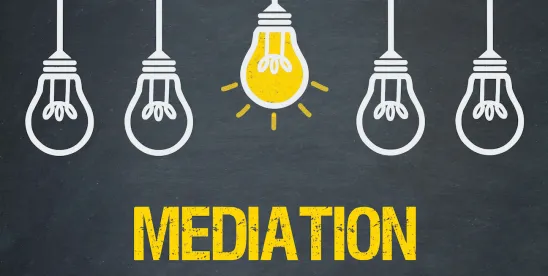Mediation is one of the most effective and often underutilized tools in the dispute resolution toolkit. Unlike litigation or arbitration, mediation is not about ‘winning ’; it’s about solving problems in a way that both sides can live with, and doing so efficiently, privately, and often creatively. Mediation is particularly valuable in bankruptcy cases, where resources are limited, timing is critical, and disputes often involve multiple stakeholders. Leslie Berkoff of Moritt Hock & Hamroff LLP emphasizes its utility in plan confirmation fights, 363 sales, valuation disputes, and insider claims: “It’s a way to create order out of chaos.”
But mediation doesn’t just happen. It requires planning, trust-building, emotional intelligence, and a structured yet flexible process. This article will explore what makes mediation successful and how attorneys and clients alike can get the most out of it.
The Mediator as Facilitator, Challenger, Counselor
The right (or wrong) mediator can be the difference between a successful resolution and a stalemate. While mediators are neutral, they are far from passive. They listen carefully, challenge assumptions, and reframe entrenched narratives to keep dialogue moving.
“The mediator wears a lot of hats: facilitator, strategist, sometimes even therapist,” Elizabeth Shampnoi of Shampnoi Dispute Resolution and Management Services, Inc. notes. “You have to build trust on both sides while pushing them to confront risk.”
Mediation is often the first time parties are forced to truly hear each other, especially if litigation has become adversarial. Mediators must create a space that feels safe but also productive.
Jeffrey Zaino of the American Arbitration Association adds that a good mediator must also have credibility: “In many cases, especially commercial or bankruptcy disputes, subject matter expertise matters. It’s not just about neutrality; it’s about knowing the terrain and earning trust.” Many parties come to mediation not just looking for a resolution, but also for an informed guide to help them weigh the risks and benefits of settlement.
While experience and subject matter expertise are crucial, personality fit can be just as important. A mediator may be respected in their field but unable to establish rapport with skeptical clients, which can be a recipe for failure.
Key traits of an effective mediator include:
- Subject matter familiarity
- Strong interpersonal and emotional intelligence
- Patience and persistence
- A reputation for fairness and discretion
The Importance of Pre-mediation Work
No good mediation begins at 9:00 a.m. on the day of the session. It starts well before that, during the preparation phase.
“Clients don’t always appreciate the value of mediation until they’re walked through what to expect,” Shampnoi observes.
Pre-mediation calls between counsel and the mediator are essential because they allow the parties to address process, potential roadblocks, and the personalities involved. They offer a chance for the mediator to identify whether a joint session would be productive, clarify expectations around authority, and ensure all parties are operating from the same set of facts. Understanding emotional dynamics and potential power imbalances is just as important as understanding the legal issues.
Key preparatory steps include:
- Providing clear, concise mediation statements
- Establishing confidentiality rules and ground rules
- Ensuring settlement authority is fully in place
- Reviewing and submitting key documents in advance
Structuring the Process
While most mediations follow a general arc, initial statements, private caucuses, and negotiation, there’s no single blueprint. A good mediator adapts to the needs of the case.
For example, Berkoff explains that she rarely insists on a joint session if she believes it will be unproductive: “Sometimes, having the parties in the same room just escalates things. It depends entirely on the dynamic.”
Shampnoi adds that “It’s all about momentum. Build some trust and movement first, then consider whether a joint discussion will help.”
Confidentiality: The Foundation of Mediation
Without confidentiality, mediation fails. Parties must feel safe to speak openly without fear that their words will come back to haunt them in court. It is critical to establish expectations around confidentiality clearly especially if there are multiple stakeholders or corporate representatives involved.
Zaino underscores the importance of confidentiality by pointing out that the American Arbitration Association enforces strict confidentiality rules: “No recordings, no disclosure, no surprises. That trust is what allows parties to take off their litigation armor.”
Hidden Hurdles
Legal disputes aren’t just about facts; they’re about people. And people bring fear, pride, grudges, misaligned incentives, and unrealistic expectations to the table particularly in disputes involving family-owned businesses or former partners. Counsel is not immune to these human traits and can sometimes be more dug in than their clients.
Good mediators are trained to spot these dynamics and use techniques like reality-testing, reframing, or separate caucusing to break through impasses. In the tough moments, the mediator must work to refocus attention on the business goals, not legal victories.
Wrapping It Up
Not all mediations result in full agreement. But even partial agreements or progress on issues can save time and money. However it is imperative to not leave the room without putting something in writing. Even if it’s just a framework or term sheet. A detailed recap ensures clarity and avoids misunderstandings. And often, full settlement follows within days once the heavy lifting has been done in the mediation session.
A Note About Virtual Mediation
Remote mediation has become a staple, and it brings both benefits and drawbacks.
While virtual mediation has made things more accessible, clients are more comfortable and costs are down, it can also dilute the human connection, according to Byeongsook Seo of Snell & Wilmer. As Seo points out, “In the virtual setting, you can’t read body language, and it’s easier for people to disengage.”
A good ‘rule of thumb’ is to use in-person mediation when stakes or emotions are high, and a virtual setting for simpler cases. For mediators who choose to engage in virtual mediation, helpful tips include:
- Using breakout rooms to preserve privacy
- Testing tech in advance
- Setting expectations around screen use and distractions
- Encouraging video-on participation where possible
Mediation Is a Craft, Not a Shortcut
The most successful mediations happen when everyone, mediator, counsel, and client, shows up prepared, open-minded, and willing to engage. The goal isn’t to win the mediation. The goal is to walk away with a solution that both sides can accept. It’s not about surrender. It’s about progress. Mediation doesn’t replace litigation, but when used wisely, it can make litigation unnecessary.
To learn more about this topic, view Conducting the Mediation. The quoted remarks referenced in this article were made either during this webinar or shortly thereafter during post-webinar interviews with the panelists. Readers may also be interested to read other articles about business law.
This article was originally published here.
©2025. DailyDACTM, LLC d/b/a/ Financial PoiseTM. This article is subject to the disclaimers found here.




 />i
/>i

